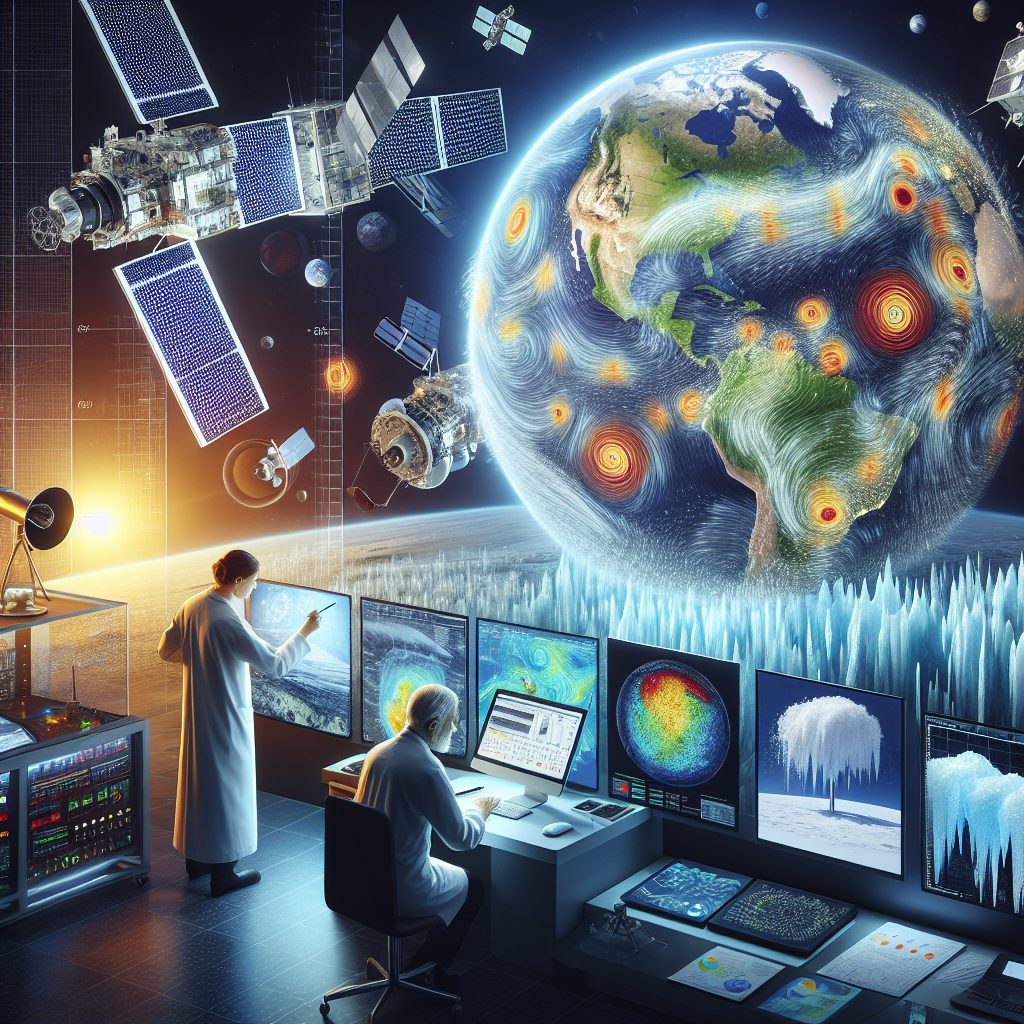
Climate science has come a long way in recent years. With more data and access to more powerful technology, researchers have been able to make groundbreaking discoveries and understand more about climate change and its effects. Advancements in climate science have helped us better plan for the future, as well as determining how we can adapt to the changing environment. With access to improved analysis tools, scientists now have a greater understanding of global trends and are better able to identify significant contributors to greenhouse gas emissions, in addition to measuring their impacts. This has been instrumental in developing plans to mitigate and reduce climate change effects. On top of this, understanding historical climate data has made deeper predictions and forecasts more accurate.
More detailed research has also enabled us to better comprehend the effects of climate change, such as changes in sea-level, increased droughts, floods and hurricanes. With the help of advanced tools and satellite imagery, we can track and study climate trends more efficiently than ever. This new data is vital for improving our response to extreme weather events, developing climate-related policies and creating an informed public about the social and economic consequences of climate change. As we move forward, new advancements in climate science will help us better understand how to move forward effectively and make the most of our efforts to combat climate change. The key takeaway from this discussion is the importance of leveraging advancements in climate science and using the newly available information to create a better future.
Key Takeaways
1. Climate science is constantly advancing, with research exploring diverse methods and technologies to help better monitor and mitigate its effects.
2. Recent advancements in technology have enabled researchers to survey larger areas for temperature, precipitation and other climate variables, resulting in more comprehensive and detailed climate data profiles.
3. Satellite-based monitoring tools are being used to remotely observe climate conditions over large areas, with the potential to create high-resolution climate models and products in near real-time.
4. Biogeochemical models, such as the carbon cycle model, are proving to be effective in understanding different aspects of the climate system and are furthering our understanding of climate change.
5. New approaches to data analysis are necessary to better assess and identify the impacts of climate change, and advise businesses and governments on the best potential responses.
What Are the Major Advancements in Climate Science?
Discovering the Sources of Climate Change
Climate science has been a cutting-edge field for decades. Scientists around the world have been working diligently to identify and quantify the causes and effects of climate change. In recent years, the discoveries made in this area of research have been invaluable in terms of understanding how humans and the environment interact. For instance, scientists have identified that burning of fossil fuels, primarily from large scale energy production, is one of the major sources of climate change due to the carbon dioxide and other greenhouse gases that are released into the atmosphere. Additionally, the effects of deforestation and land management practices have been identified as major contributors to climate change as well.
Developing Solutions to Reduce Climate Change
By understanding the causes of climate change, new solutions to reduce its effects have been developed. In some cases, these solutions center around the use of alternative fuel sources, such as solar, wind and other renewable energy sources, which greatly reduce emissions from coal and other fossil fuels. Additionally, changes to land management practices, such as reducing deforestation and incentivizing reforestation, may have positive impacts on the climate. In addition, governments and municipalities have been implementing policies to reduce their emissions as well, including measures such as a carbon tax or emissions trading.
Predicting and Monitoring Future Changes in Climate
Another breakthrough in climate science is the ability to accurately predict and monitor changes to the climate based on current trends. This has been made possible by advances in computer modeling and climate data collection methods, along with a better understanding of the causes and effects of climate change. By using these methods, scientists can now accurately predict the effects of global warming and other changes in the climate on regional and global scales.
What Are the Benefits of Advances in Climate Science?
The advancements in climate science have many potential benefits. As mentioned earlier, they have enabled more accurate predictions of the impacts of climate change and allowed governments and municipalities to develop more comprehensive strategies for reducing emissions. Additionally, they have enabled better monitoring of the environment to ensure it is being managed appropriately, particularly in vulnerable or threatened areas. Finally, breakthroughs in this field have also allowed for a better understanding of the potential impacts of climate change on the environment and our society as a whole.
Tips for Making the Most of Climate Science Advancements
1. Keep up to date with new research in the field of climate science to ensure you have a comprehensive understanding of the causes and effects of climate change.
2. Support governments and municipalities that are proactively developing strategies to reduce emissions and improve environmental sustainability.
3. Support businesses and organizations that are investing in renewable energy sources and implementing sustainable land management practices.
4. Educate yourself and others about the effects of climate change and ways to reduce its potential impacts.
5. Advocate for meaningful public policy changes that incentivize the reduction of emissions and sustainable development.
What are the advancements in climate science?
Climate science is the study of climate change and its effects on the environment. It includes both physical and social sciences, such as meteorology, oceanography, anthropology, physics, ecology, and Economics. With the advancements in technology, data collection, computer models, and analysis, climate scientists are able to better understand the Earth’s climate and make predictions on future climate changes.
What are the effects of climate science?
Climate science can help us better understand our environment and the changes that are occurring to it. With a better understanding, comes more responsible choices and plans for the future. For example, with data and models of future climates, municipalities and governments are able to plan for the effects of climate change in terms of infrastructure and public services. Furthermore, climate science can help inform policy-making on global scales, helping us to make more cohesive, informed decisions that will benefit society and the environment.
How can I learn more about climate science?
There are many different ways to learn more about climate science and its effects. The internet is a great source of information, offering literature, online courses, webinars and podcasts. Additionally, many scientific and research-focused organizations are a great resource for gaining knowledge and staying informed on the latest advances in climate science.
Are there any organizations that focus on climate science?
Yes, there are many organizations worldwide focused on climate science research and analysis. Organizations such as NASA’s Earth Science Division, National Oceanic and Atmospheric Administration (NOAA), World Meteorological Organization, and The Climate Change Institute are just a few. Each of these organizations provide advanced research and shared data that can help those interested in climate science stay informed.
What role does technology have in climate science?
Technology is a key player in advancing our understanding of climate science. Technologies such as satellites, aircraft, and ground radiosondes can measure temperatures, ice coverage, ocean salinity and more. Advances in computer modeling simulate future climate changes with increasing accuracy, helping us to better plan for the future.
What is the most important goal in climate science?
The most important goal in climate science is to understand the changing climate, why it is changing, and what effects can be expected in the future. With this knowledge, governments and organizations can make informed decisions that help reduce the effects of climate change and to plan for a better future.
What are some steps we can take to further climate science research and analysis?
There are many steps that can be taken to further climate science research and analysis. Investing in research projects and technologies that improve resilience to climate change is a great start. Additionally, educating and advocating for policies that support renewable energy, carbon emissions reduction, and waste management are also valuable steps. Finally, supporting organizations that strive towards reducing our vulnerability to climate change and its effects is essential.
What is the difference between climate science and climate engineering?
Climate science is the study of climate change and its effects on the environment. It includes both physical and social sciences, such as meteorology, oceanography, anthropology, physics, ecology, and economics. On the other hand, climate engineering is the use of technology to manipulate the environment and reduce global warming or offset some of its effects. It can include strategies such as carbon capture and storage, geoengineering, and solar radiation management.
How can I get involved with climate science?
Getting involved with climate science is easy! Consider volunteering at local organizations focused on climate science or volunteering in research projects. There are also organizations and networks that allow individuals to make donations in support of climate science research. Finally, stay informed and reach out to elected officials to advocate for climate science related policies.
What is the best way to stay current on climate science?
The best way to stay current on climate science is to stay informed on climate-related news and events. There is a wealth of information online from reliable sources such as the Intergovernmental Panel on Climate Change (IPCC), National Oceanic and Atmospheric Administration (NOAA) and NASA’s Earth Science Division. Additionally, subscribing to newsletters and blogs focused on climate science is a great way to stay up to date.
Final Thoughts
Advancements in climate science have provided us with an unprecedented level of insight into the causes and effects of climate change. With the newfound knowledge, society can take action to mitigate its effects and better prepare for the future. However, access to information on climate science is still limited and more effort must be made to spread awareness on the current situation to enact meaningful change. Climate science is a complex topic and requires collaboration amongst numerous stakeholders, international bodies and governments, and citizens alike to find a viable solution.
Advancements in climate science are allowing us to make informed decisions and plan for a more sustainable future. By supporting organizations that work towards reducing our vulnerability to climate change and its effects, staying informed on climate-related news and events, and advocating for climate science related policies, everyone can help make a positive impact.



